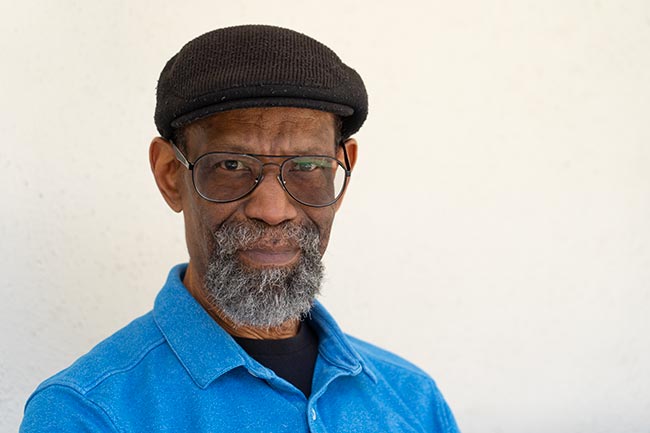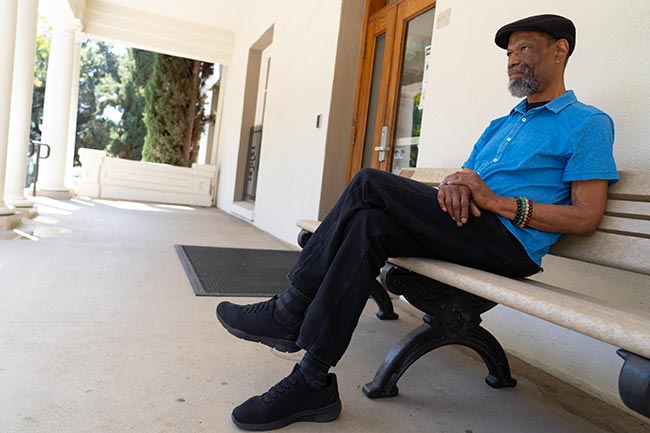ULV professor brings big idea to South Africa

University of La Verne professor Richard Rose pictured outside Miller Hall last Friday. Courier photo/Andrew Alonzo
By Andrew Alonzo | aalonzo@claremont-courier.com
Longtime Claremont resident and University of La Verne professor Richard Rose is about to take a big idea to South Africa’s 2024 Ubuntu Festival, a four-day global conference held in conjunction with South Africa’s Human Rights Day.
Rose, 64, and his daughter Rochelle will show a video they created, “Building the Beloved Community,” at the festival on March 22. The video describes the course of the same name Rose designed for ULV students. Rose will also host a discussion about the similarities between the course and “Ubuntu,” a group of African value systems that emphasize the interconnectedness of individuals with their surrounding societal and physical worlds, “and how we might be able to work across the Atlantic to achieve common goals.”
Last year, the Rev. Jan Chase of Unity Church of Truth Pomona introduced Rose to the Circle of Chairs, a Claremont group of nonprofits and community members focused on solving local and global issues. The group inspired Rose to teach students how to facilitate their own communal dialogues at ULV.

University of La Verne professor Richard Rose pictured outside Miller Hall last Friday. Courier photo/Andrew Alonzo
In fall 2023 Rose began teaching the new “building the beloved community” course. It started as a “topics designation course,” meant to dive into a topic not covered by a standard curriculum. The aim is to weave building the beloved community into ULV’s philosophy curriculum. Rose recently filed paperwork to have the course become mandatory within the department in fall 2024.
In addition to course work and dialogues, students in his “building the beloved community” class must complete 20 hours of community service at various local entities with ties to the Circle of Chairs, such as Lopez Urban Farm, Pilgrim Place, and the Pomona Valley Branch of the NAACP.
The course was designed to engage students from multiple walks of life.
“It’s the circle process that brings everyone into the course,” Rose said. “It really becomes very personal and intimate in terms of their contribution to the course and vision for what it might provide for others. Whoever and whatever you are, you come and you just share what you have, what your vision is for building the beloved community for the context in which you operate.
“I think we’re in a time right now where people need hope. People need to see something that allows them to say ‘Maybe there’s a chance that we can get out of the mess that we are in.’ Without having concrete examples of where things are actually working, where people are actually getting along. It’s hard for people to have hope because they’ve seen so much destruction, disaster. You know people are killing people basically on a daily basis now. And so to provide examples where people are actually living harmoniously seeking community, and thriving because of it, gives people an alternative. It doesn’t have to be so doomsday about the future. I think providing that kind of hope is good. Not that everyone will latch on to it, but those who are hopeful may.”
After Rose met with Chase, he applied for and received a $20,000 Life Worth Living grant from the Yale Center of Faith and Culture. The money was used to fund the video and pay for his travel to and lodging at the 2024 Ubuntu Festival.
Rose is excited to be bringing the idea to South Africa and hopes a step toward world peace is achieved by putting it on the global stage. Ubuntu means “I am because we are” in Zulu, a dialect of the Nguni ethnic group in Southern Africa. This aligns with the principles of nonviolence, love, and justice ingrained in the beloved community, Rose said.
“It’s the notion that the beloved community treats everyone equally, everyone has a voice and can participate,” he said. “Not that there won’t be challenges, but that we can use principles of nonviolence and conflict resolution to overcome those challenges as opposed to war, military machines, and that sort of thing.
“Even though the continents and the African peoples especially have been divided because of slavery and other things, there are common roots that might allow us to come back together and do something that is good for the globe.”








0 Comments